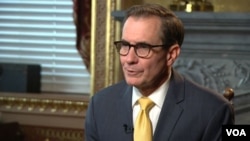The U.S. hopes that with the transfer of blocked Iranian funds from banks in South Korea to Qatar completed, the five Iranian Americans held in the Islamic Republic will be home “in the coming days.”
In an interview with VOA Persian’s Farhad Pouladi, John Kirby, the National Security Council's coordinator for strategic communications, also spoke about U.S. support for the Iranian people on the eve of the first anniversary of Mahsa Amini’s death while in the custody of Iran's morality police. Kirby also answered questions about Haiti and the flood of migrants in New York City.
This transcript has been edited for clarity and brevity.
Farhad Pouladi, VOA Persian's White House Correspondent: Thank you, Admiral, for doing this. So, we are coming to the first anniversary of the death of Mahsa Amini in the custody of Iran’s morality police. What more can the United States do to support the Iranian people in their struggle for freedom?
John Kirby, National Security Council Coordinator for Strategic Communications: Well, look, we've laid out some additional sanctions here just this week. We've got many, many sanctions in place against Iranian leaders, particularly those that were involved in her death and in the persecution and violence against protesters in Iran. We stand for the Iranian people, and we stand for their right to protest peacefully, and to speak for themselves and for their desires and what they want to see out of the government in Tehran. Our beef is not with them. In fact, we're standing solidly behind them.
VOA: Has there been any recent contact with the Americans that are coming home? I mean, do you have ... a time frame [for] when the Americans are coming home, and has the Swiss Embassy, which is representing the U.S., had any contact with them? Do you have any updates on their physical and mental situation?
Kirby: We have, through the Swiss protecting power, we have been able to maintain contact with all the Americans that are in house arrest. From what we can tell, they appear to be in good health. We’ll obviously want to make sure that they have appropriate access to medical care when they get out of the country. I’m not at liberty to talk about the timing here. The next critical step in the process was to move the funds from South Korea to Qatar, and now the next step coming is going to be seeing if we can get them home. We hope that that will happen in the coming days, but I just don't have any specific updates.
VOA: The EU3 — Britain, France and Germany — announced yesterday they will retain sanctions on Iran that were scheduled to expire after October 18 under the 2015 nuclear deal known as the JCPOA. So why not trigger the snapback mechanism in the agreement, which would keep all the U.N. sanctions in place?
Kirby: I just don’t have anything with respect to snapback to speak to today. Again, we're not focused right now on getting back into the JCPOA. That's not on the agenda right now. We're doing everything we can to get our Americans home and to continue to hold Iran accountable for their destabilizing behavior.
VOA: Any update on the increased U.S. naval presence in the Persian Gulf in order to deter Iranian naval and air transgressions? Because today we had a report that two new tankers have been seized by Iran.
Kirby: Again, I would refer you to the Pentagon on that. I know we have bolstered some of our military presence in and around the Gulf for exactly that reason, to respond to and to try to deter attacks on shipping. This is yet another piece of destabilizing behavior that the Iranians continue to conduct that we’ve got to make sure that we've got the capabilities and resources to deter that as much as possible.
VOA: Is the U.S. involved in the process of Kenya sending a police force to Haiti, and where does the U.S. stand on that?
Kirby: We're grateful for Kenya's willingness to do that. We have long said we believe that some sort of policing force, international policing force, would be appropriate. And obviously it has to be acceptable to the people of Haiti. But the violence has got to stop and the instability has got to stop.
VOA: The U.N. General Assembly is hosted in the city of New York, whose mayor said the city is facing a profound crisis with thousands of migrants that need attention from the president. What is the U.S. doing about it?
Kirby: New York City wouldn't be under this pressure if governors in other parts of the country weren't shipping migrants without any regard for their care to cities in the North. We understand that there's pressure being applied there. We're going to continue to do everything we can, as I've said many times before, to improve legal pathways into the country and to shore up our security efforts at the border to dissuade illegal immigrants from coming in. Part of that is, of course, making sure that the Border Patrol has the resources that they need, and we have added to their resources. We still have U.S. military troops down there bolstering their efforts. The president has asked Congress for additional funds for more Border Patrol agents. And on day one of this administration, he submitted an immigration reform bill that Congress has yet to act on. So, we will continue to do everything we can, within the authorities that we have, to shore up the border to make sure that legal pathways are expanded, to discourage people from taking that dangerous, dangerous journey without having to apply for legal entry, and to make sure our brave Border Patrol agents have the resources that they need.
VOA: Admiral, thank you very much for your time. Thank you.
Kirby: My pleasure.




